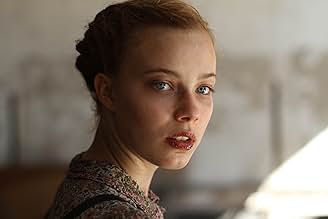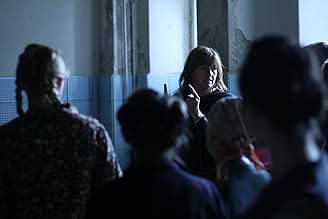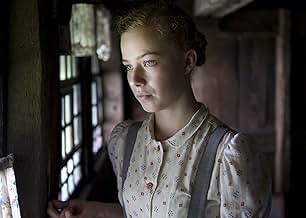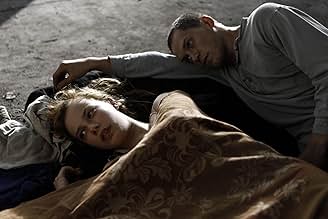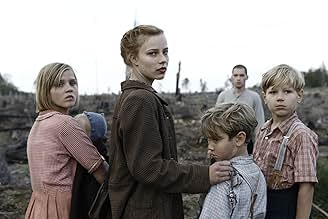Lore
- 2012
- Tous publics
- 1h 49min
NOTE IMDb
7,1/10
16 k
MA NOTE
Vers la fin de la guerre, Lore entraîne ses frères et soeurs dans un voyage qui leur dévoilera la vérité sur leurs parents. Une rencontre avec un mystérieux réfugié oblige Lore à faire confi... Tout lireVers la fin de la guerre, Lore entraîne ses frères et soeurs dans un voyage qui leur dévoilera la vérité sur leurs parents. Une rencontre avec un mystérieux réfugié oblige Lore à faire confiance à une personne qu'on lui a appris à haïr.Vers la fin de la guerre, Lore entraîne ses frères et soeurs dans un voyage qui leur dévoilera la vérité sur leurs parents. Une rencontre avec un mystérieux réfugié oblige Lore à faire confiance à une personne qu'on lui a appris à haïr.
- Réalisation
- Scénario
- Casting principal
- Récompenses
- 34 victoires et 34 nominations au total
Kai-Peter Malina
- Thomas
- (as Kai Malina)
Nick Holaschke
- Baby Peter
- (as Nick Leander Holaschke)
Claudia Geisler-Bading
- Ox Cart Woman
- (as Claudia Geisler)
Hanne B. Wolharn
- School House Woman 3
- (as Hanne Wolharn)
Avis à la une
The unusual thing about Lore is that, perhaps for the first time, we witness the devastation that Germany itself suffered as a result of World War II. And that was no little thing, something many are not aware or perhaps do not acknowledge.
As for the film, following the end of the war and specially the death of the one many Germans had come to think of as a saviour there is a sense of hopelessness and devastation.
In the family that the focus is placed, the mother has to entrust the safety and wellbeing of her children to her teenage daughter Lore. This mother had to flee for reasons that remained unknown.
What follows is that Lore had to abruptly grow up, without any training or warning and face a battle for survival as she heads to a place of safety. The film therefore is a chronicle of the journey undertaken by 4 children, led by a teenager, from a place of abandonment to a place of safety.
During this journey, they had to face the best and worst of human nature in their encounters with others. Some tried to help, whilst others only cared to take advantage of their predicament. An interesting scene was in the house of a woman who had a framed photo of the Fuhrer and said: Can you believe the lies they said about him? e only wanted to help? The endeavour got even more interesting when their paths crossed with a young Jewish man, who though seemed helpful the young lady in charge had to face a dilemma: In this difficult hour, do we get the help we desperately need from someone willing, or because I was brought up believing he is part of a filthy, inferior people I should just disregard him? The sexual tension between the two is also pivotal for the outcome of this adventure.
Furthermore, it seemed incomprehensible to this young person, how the country of superior people that was meant to lead the world is now occupied and divided into a Russian, American and British zones. He hear somewhere in the film: I am German and this is Germany.
A striking, sensitive film about growing up suddenly, the extreme sides of human nature and where the ultimate battle for survival can lead us to.
As for the film, following the end of the war and specially the death of the one many Germans had come to think of as a saviour there is a sense of hopelessness and devastation.
In the family that the focus is placed, the mother has to entrust the safety and wellbeing of her children to her teenage daughter Lore. This mother had to flee for reasons that remained unknown.
What follows is that Lore had to abruptly grow up, without any training or warning and face a battle for survival as she heads to a place of safety. The film therefore is a chronicle of the journey undertaken by 4 children, led by a teenager, from a place of abandonment to a place of safety.
During this journey, they had to face the best and worst of human nature in their encounters with others. Some tried to help, whilst others only cared to take advantage of their predicament. An interesting scene was in the house of a woman who had a framed photo of the Fuhrer and said: Can you believe the lies they said about him? e only wanted to help? The endeavour got even more interesting when their paths crossed with a young Jewish man, who though seemed helpful the young lady in charge had to face a dilemma: In this difficult hour, do we get the help we desperately need from someone willing, or because I was brought up believing he is part of a filthy, inferior people I should just disregard him? The sexual tension between the two is also pivotal for the outcome of this adventure.
Furthermore, it seemed incomprehensible to this young person, how the country of superior people that was meant to lead the world is now occupied and divided into a Russian, American and British zones. He hear somewhere in the film: I am German and this is Germany.
A striking, sensitive film about growing up suddenly, the extreme sides of human nature and where the ultimate battle for survival can lead us to.
You'd think that, 68 years after the end of the second World War, every perspective would have been covered by the numerous films that have been made about it. But 'Lore' proves that it's still possible to make a movie about an unknown aspect of the war.
In this case, it's the situation in Germany just after the victory of the allied forces. It's a very interesting perspective, because things get turned around. The Nazis are no longer powerful rulers, but hapless losers, afraid to get caught by the Americans. And the Jews, although still despised by most Germans, are the ones who get things done with the allied troops.
The movie shows a country in an almost apocalyptic state, with dead people and destructed buildings everywhere. Citizens can't trust each other and are willing to do anything for some food or transportation. The powers are constantly shifting; an ally can suddenly turn into an enemy.
It's in this utterly destructed and disheartened country that a family without parents is finding its way, led by Lore, a girl of approximately 16 or 17 years old. Her parents, high-ranking Nazis's, have left her to hide from the Americans, and it's up to her to lead her younger sister and three little brothers (of which one is still a baby) to her grandmother in the north of the country. They have to beg for food and shelter, sometimes paying with the jewels her mother left behind.
Australian director Cate Shortland is very good in capturing the mood of desperation and defeat. She uses faded colours, almost like a Polaroid picture, and shows lots of close-ups. Not only of faces, but also of hands, feet, clothes and shoes. It accentuates the oppressive atmosphere in post-war Germany, and the terrible fate of the children. The story gets a twist when the children meet a young man, who for some reason is willing to help them. The relationship between Lore and the young man is ambiguous, for several reasons.
'Lore' is not easy to watch. There are several disturbing and gruesome scenes in the film. But it's a gripping tale of the human urge to survive in almost inhuman circumstances. And most of all, it reminds us of the utter horrors of war. This war, and any war.
In this case, it's the situation in Germany just after the victory of the allied forces. It's a very interesting perspective, because things get turned around. The Nazis are no longer powerful rulers, but hapless losers, afraid to get caught by the Americans. And the Jews, although still despised by most Germans, are the ones who get things done with the allied troops.
The movie shows a country in an almost apocalyptic state, with dead people and destructed buildings everywhere. Citizens can't trust each other and are willing to do anything for some food or transportation. The powers are constantly shifting; an ally can suddenly turn into an enemy.
It's in this utterly destructed and disheartened country that a family without parents is finding its way, led by Lore, a girl of approximately 16 or 17 years old. Her parents, high-ranking Nazis's, have left her to hide from the Americans, and it's up to her to lead her younger sister and three little brothers (of which one is still a baby) to her grandmother in the north of the country. They have to beg for food and shelter, sometimes paying with the jewels her mother left behind.
Australian director Cate Shortland is very good in capturing the mood of desperation and defeat. She uses faded colours, almost like a Polaroid picture, and shows lots of close-ups. Not only of faces, but also of hands, feet, clothes and shoes. It accentuates the oppressive atmosphere in post-war Germany, and the terrible fate of the children. The story gets a twist when the children meet a young man, who for some reason is willing to help them. The relationship between Lore and the young man is ambiguous, for several reasons.
'Lore' is not easy to watch. There are several disturbing and gruesome scenes in the film. But it's a gripping tale of the human urge to survive in almost inhuman circumstances. And most of all, it reminds us of the utter horrors of war. This war, and any war.
It's a punchline movie.
The ending ties it up well and puts it in proper perspective. Human perspective.
The movie, for me, is largely symbolic, archetypical. Lore is not really a person she IS the immediate post-war Germany.
Everything that she experiences, all her opinions, all the opinions she is exposed to and indoctrinated with, are the points of view of millions of the German populace.
How she deals with it, or denies it is how Germany dealt with and denied it. The 'it' being the entire ethos that permitted/enabled WWII.
In a sense all cultures are a form of mass hysteria, mass hypnotism. Societies indoctrinate as part of their nature, actually part of their definition is the values with which they indoctrinate their populace.
If the values are extreme and violent, the populace often follows. It the society fails at its aims and is physically destroyed, then the population becomes valueless and must die or reinvent itself.
Post WWI German society didn't die, so this is a movie about the pressures, the pressure cooker, in which gave birth to its reinvention.
So, as a piece of symbolic representation, it's magnificent.
There are no plot holes, every bit of dialog, every image, in necessary for understanding.
And patience is required. The viewer assembles all the images, all of Lore's perceptions.
And the pressure cooker cooks.
The ending ties it up well and puts it in proper perspective. Human perspective.
The movie, for me, is largely symbolic, archetypical. Lore is not really a person she IS the immediate post-war Germany.
Everything that she experiences, all her opinions, all the opinions she is exposed to and indoctrinated with, are the points of view of millions of the German populace.
How she deals with it, or denies it is how Germany dealt with and denied it. The 'it' being the entire ethos that permitted/enabled WWII.
In a sense all cultures are a form of mass hysteria, mass hypnotism. Societies indoctrinate as part of their nature, actually part of their definition is the values with which they indoctrinate their populace.
If the values are extreme and violent, the populace often follows. It the society fails at its aims and is physically destroyed, then the population becomes valueless and must die or reinvent itself.
Post WWI German society didn't die, so this is a movie about the pressures, the pressure cooker, in which gave birth to its reinvention.
So, as a piece of symbolic representation, it's magnificent.
There are no plot holes, every bit of dialog, every image, in necessary for understanding.
And patience is required. The viewer assembles all the images, all of Lore's perceptions.
And the pressure cooker cooks.
An intense coming of age film set during an immense period of modern European history. Finding original stories related to the European theatre of World War Two is difficult, however this film brings an engaging and refreshing lens to the period.
The film focuses on the events at the end of World War II including the death of Adolf Hitler, the tracking down of the perpetrators of the Holocaust, the aftermath of camp survivors, and the territorial carve up of Germany. A time of lawlessness, starvation and depredation.
Within this historical period the film focuses on 5 children brought up as Hitler's Youth, who are on a journey to their Aunt's. The journey brings both physical and psychological challenges along the way for the children. Lore as the eldest child takes on the responsibility of guide, provider and parent. The historical events create the incredible physical tension in the film of a fallen 'utopia' with all of its personal dangers, violence, and hardship.
Along the way they encounter Thomas, a recently released from a concentration camp. The ensuing relationship between Lore and Thomas, which is part survival, part attraction, part revulsion and part adolescent, creates the psychological tension that is at the centre of the film.
The film has echoes of the Films Downfall of the Third Reich and Zentropa in its subject material. All three films by necessity are deeply intense psychological films. The end of the world as most in Germany new it and the incredible psychological changes that the ushering of an entirely new political, social and cultural regime brings. In my world it is almost impossible to imagine, but the children that lived through this are still alive, still with us, the living memories of that period of incredible turmoil. Fertile ground for story telling and film telling about our world and our society.
The film focuses on the events at the end of World War II including the death of Adolf Hitler, the tracking down of the perpetrators of the Holocaust, the aftermath of camp survivors, and the territorial carve up of Germany. A time of lawlessness, starvation and depredation.
Within this historical period the film focuses on 5 children brought up as Hitler's Youth, who are on a journey to their Aunt's. The journey brings both physical and psychological challenges along the way for the children. Lore as the eldest child takes on the responsibility of guide, provider and parent. The historical events create the incredible physical tension in the film of a fallen 'utopia' with all of its personal dangers, violence, and hardship.
Along the way they encounter Thomas, a recently released from a concentration camp. The ensuing relationship between Lore and Thomas, which is part survival, part attraction, part revulsion and part adolescent, creates the psychological tension that is at the centre of the film.
The film has echoes of the Films Downfall of the Third Reich and Zentropa in its subject material. All three films by necessity are deeply intense psychological films. The end of the world as most in Germany new it and the incredible psychological changes that the ushering of an entirely new political, social and cultural regime brings. In my world it is almost impossible to imagine, but the children that lived through this are still alive, still with us, the living memories of that period of incredible turmoil. Fertile ground for story telling and film telling about our world and our society.
Lore is an intense drama involving a period of post-WW II German society that is rarely if ever examined and to do it, as this film does, from the viewpoint of German children caught up in these tragic days is worth a visit just out of curiosity. However, this film does not just take a dispassionate look from the viewpoint of historian's or news print, rather because of the wonderful direction of Cate Shortland, this movie moves completely away from ordinary story telling into the far less examined area of psychological change.
Superficially this story is about a family of young children who are forced because of Germany's WW II defeat to make their way from the Black Forrest to their grandmother's home near Hamburg in northern Germany. The story concerns the time before that long journey, the incidents of that journey and finally their arrival at their grandmother's home. Sounds simple and straight forward but the devil, as they say is in the details, or rather the story.
As the story unfolds while the children attempt to reach the grandmother's home, the viewer explores through the eldest, who leads this group, many of the consequences of her past history as a child growing in this family with all the mental baggage implied by this maturation. The drama is carried by this eldest child, Saskia Rosendahl, to whom many of the film's incidents occur.
Moviegoers might be struck by the close-ups used by the director; most of the movie's shots are taken at that range and viewers may not like the method. It contributes to an extremely distinct film, along with the story as well as Rosendahl's superb acting, which must affect the viewer and this after all is why we attend movies to begin.
Superficially this story is about a family of young children who are forced because of Germany's WW II defeat to make their way from the Black Forrest to their grandmother's home near Hamburg in northern Germany. The story concerns the time before that long journey, the incidents of that journey and finally their arrival at their grandmother's home. Sounds simple and straight forward but the devil, as they say is in the details, or rather the story.
As the story unfolds while the children attempt to reach the grandmother's home, the viewer explores through the eldest, who leads this group, many of the consequences of her past history as a child growing in this family with all the mental baggage implied by this maturation. The drama is carried by this eldest child, Saskia Rosendahl, to whom many of the film's incidents occur.
Moviegoers might be struck by the close-ups used by the director; most of the movie's shots are taken at that range and viewers may not like the method. It contributes to an extremely distinct film, along with the story as well as Rosendahl's superb acting, which must affect the viewer and this after all is why we attend movies to begin.
Le saviez-vous
- AnecdotesThe family photographs in the wallet that Lore looks at are pictures of director Cate Shortland's husband's family.
- GaffesThe derelict tank the children pass in the forest is a post-WW2 manufactured Russian T-54/55 or T-62 tank. The balk cross painted on the turret is indicative of an early war paint scheme. Later in the war the 'lines' were thicker.
- ConnexionsFeatured in Film '72: Épisode datant du 13 février 2013 (2013)
- Bandes originalesJugend will marschieren
(Alte Aufnahme)
Folksong
Arranged by Lisa Carlyna Zumpano (ASCAP)
Published by Audiosparx (ASCAP)
Meilleurs choix
Connectez-vous pour évaluer et suivre la liste de favoris afin de recevoir des recommandations personnalisées
- How long is Lore?Alimenté par Alexa
Détails
Box-office
- Budget
- 4 300 000 € (estimé)
- Montant brut aux États-Unis et au Canada
- 970 325 $US
- Week-end de sortie aux États-Unis et au Canada
- 31 498 $US
- 10 févr. 2013
- Montant brut mondial
- 2 362 019 $US
- Durée1 heure 49 minutes
- Couleur
- Mixage
- Rapport de forme
- 1.85 : 1
Contribuer à cette page
Suggérer une modification ou ajouter du contenu manquant



